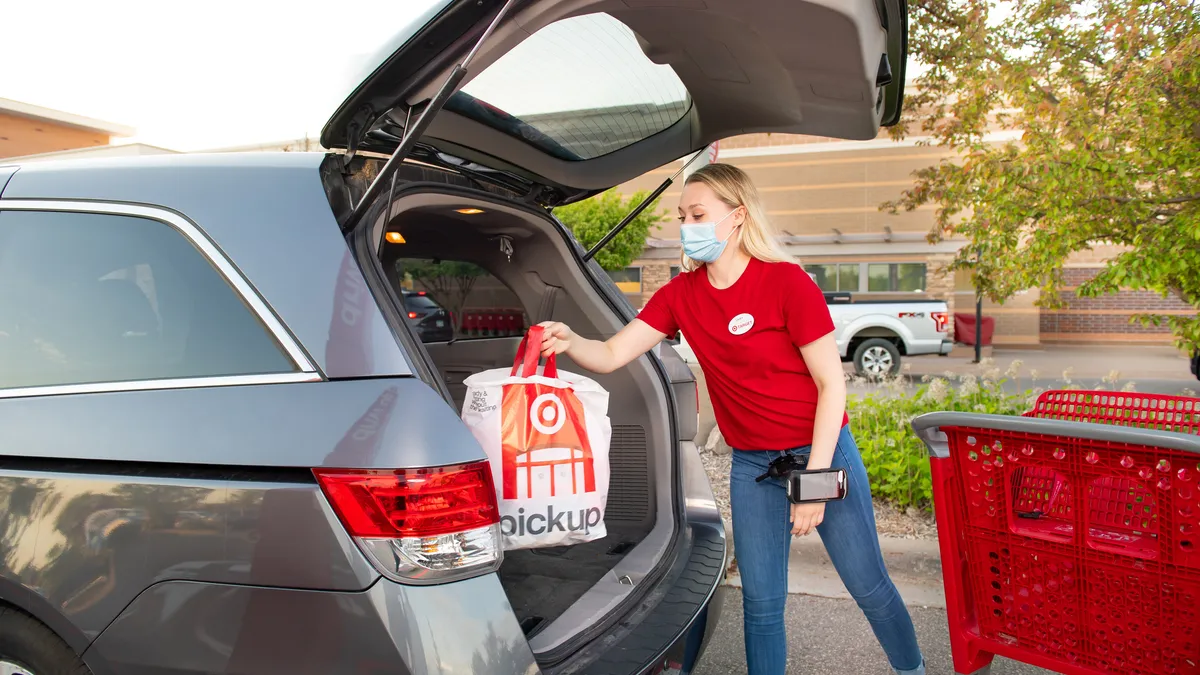Dive Brief:
- Despite a tough comparison against last year's gains, Target grew its sales and market share significantly in the first quarter. First quarter comparable sales grew 22.9% and operating income rose 407% to $2.4 billion in Q1, it shared last week.
- As more and more of the country becomes vaccinated and cases continue dropping, consumers have felt more comfortable shopping and gathering. Total revenue grew 23.4% to $24.2 billion, driven by apparel sales increasing more than 60%, and home and hardline sales both jumped over 30%. Finally, private label sales grew 36% — the strongest the retailer has recorded.
- "Consumers have increased confidence, and the impact of the vaccine rollout and a strengthening economy [is giving them] a spring in their step, and they're coming back to Target stores," CFO Michael Fiddelke told Yahoo Finance last week.
Dive Insight:
As more consumers get vaccinated and the threat of the virus slowly wanes, Target's senior executives told investors and analysts in a call that the company is expecting events and celebrations — such as Father's Day and back-to-school shopping — to prompt consumers to spend.
"We've seen an enthusiastic return in in-store shopping. Guests are happy to come back to our store because they love the environment we created and invested in over time," Chairman and CEO Brian Cornell said during the call. "As a result, our store comp sales increased 18% in Q1, driven almost entirely by higher traffic, and accounting for the vast majority of our growth."
Though its digital channels were the primary driver last year in Q1, Target executives largely credited in-store shopping for its results so far this year — staying true to its mission of putting stores at the center of its business.
"There are some factors unique to the quarter," Fiddelke told analysts. "We've got a $110 million headwind from the way our returns reserve calendar rises between Q1 and Q2. [And] we're investing in the team and in-store payroll to make sure we're staffed and in stock to support the sales we expect to come."
"Stores continued to be the linchpin of Target's online capability, once again validating management's strategic decision to position them at the center of its online flywheel, with ship from, in store-pick-up, and curbside all benefiting, resulting in continuing robust online sales growth as consumers avail themselves of these flexible options," Moody's Vice President Charlie O'Shea said in emailed comments.
For Q1, more than 95% of Target's total sales were fulfilled by store assets and inventory. The retailer's emphasis on its stores prompted its $4 billion annual investment to put up additional locations, improve fulfillment and update existing stores over the next few years.
"We can do a lot with the volumes that we've built over the last two years in some of those same-day services, and all of that volume translates to more efficiency opportunity as we continue to squeeze down the per-unit cost to fulfill," CFO Michael Fiddelke said, according to Supply Chain Dive.
Compared to the first quarter of 2020, when shoppers were stocking up on goods and groceries, Target experienced low- to mid-single-digit sales on both essentials and food and beverage. Still, Target gained $1 billion in market share in the first quarter of 2021 on top of the $1 billion it earned around the same time last year.
Despite the high figures to beat from the previous fiscal year, Target expects a mid-to-high single-digit increase in comp sales in the second quarter and positive single-digit comp sales growth in Q3 and Q4.
And despite the pockets of inflation Target and other retailers have been seeing amid a reopening economy, Fiddelke is unconcerned about managing supply and demand.
"One of the things that gives me a lot of comfort is that we've got leaders managing the costs of our business, and our teams have a lot of experience managing those changes," he said. "We feel really good about our price positioning. And given the diversity of the categories in which we sell, we've got a lot of levers to offset any headwinds, should they pop up, from an inflation perspective."
Fiddelke remains confident Target can continue making profits during a period of inflation. "We believe we've got a model that's proven its durabilty over time," he said. "When we have a healthy top line, when guests continue to turn to Target more and more, we can make the rest of the P&L work out with all the levers that we have to pull. So I'm really confident that we'll be able to translate continued growth and market share gain over time into growing profits."
Target committed to a starting $15 wage for all its workers, a goal it reached last year, Fiddelke said. Going forward, it will continue putting the support of the team front and center.
"From where I sit as CFO, there's no investment that's more important or has a higher return than the investments we've made in our team," Fiddelke told Yahoo.














